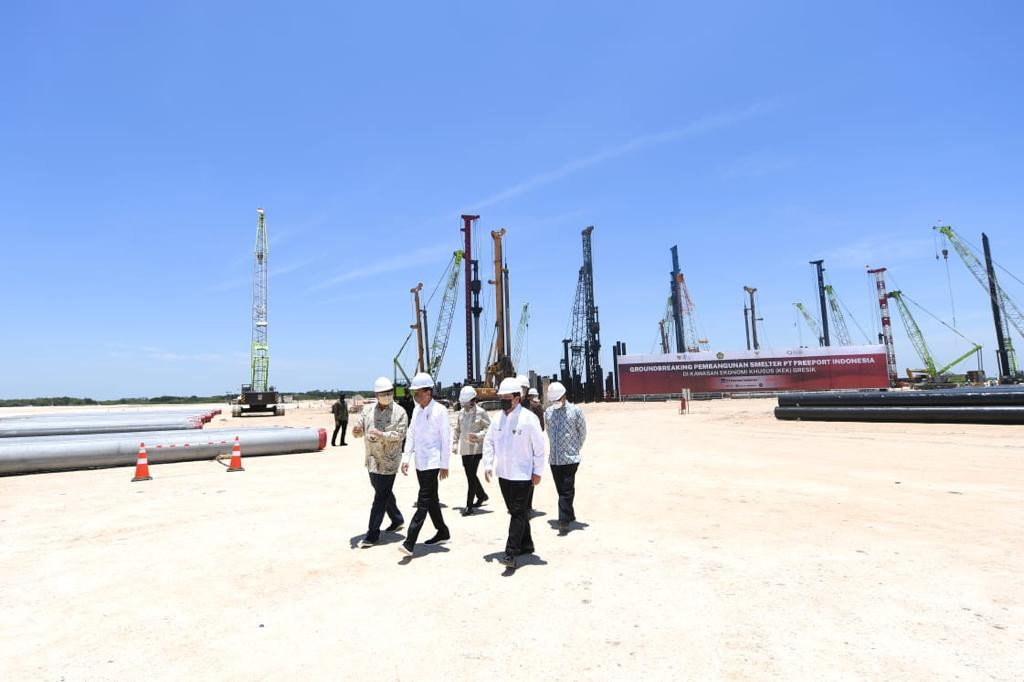Popular Reads
Top Results
Can't find what you're looking for?
View all search resultsPopular Reads
Top Results
Can't find what you're looking for?
View all search resultsRescheduling export ban
Stopping the production of copper concentrate will not only adversely affect export earnings and state revenues but also will cause massive worker layoffs.
Change text size
Gift Premium Articles
to Anyone
T
he government should fulfill the industry’s request for the postponement of the export ban on copper concentrate from June 2023, in accordance with the 2020 Mining and Coal Law, to early 2025, otherwise the country’s copper mining industry will be crippled as it will have to cut production by 3 million metric tons with all the devastating repercussions on the national economy.
Stopping the production of copper concentrate will not only adversely affect export earnings and state revenues but also will cause massive worker layoffs at PT Freeport Indonesia in Papua and PT Amman Mineral in West Nusa Tenggara, the country’s two largest copper producers.
The problem is that Freeport’s greenfield copper smelter in Gresik and the expansion of its existing Gresik smelter, which have a combined processing capacity of 3 million metric tons of copper concentrate, and Amman’s smelter in West Nusa Tenggara with an annual capacity of 900,000 tons, will be on stream only in 2024. The social-mobility restrictions to contain COVID-19 over the past two years may have contributed to the slowing down of construction of the processing facilities.
Rescheduling the export ban on copper concentrate does not have anything to do with concerns that the European Union may again sue Indonesia at the Geneva-based World Trade Organization as it did with the nickel ore export ban. The campaign by EU against the government’s policy of promoting the development of downstream processing of minerals, will simply make the country remain a supplier of cheap primary commodities to the advanced economies and stuck outside the global value chain.
The copper concentrate export ban also would not likely cause such an international controversy as that stirred by the nickel ore export ban since 2020 because, according to the United States Geological Survey in 2020, Indonesia owns only 3 percent of the world’s reserves of copper.
But because of the ubiquity of copper and the global campaign to mitigate the climate change by transitioning from fossil fuels to renewable energy, this mineral, like nickel, will play an increasingly important role within the global economy. The fact is that electrification, a pillar of the transition from fossil energy to green energy, requires huge amounts of copper. Hence, the development of downstream nickel and copper industries will help accelerate Indonesia’s transition into green energy.
The government should hold to its strategy of gradually developing the downstream processing of its minerals to generate more jobs and higher value added to the economy as it has done with nickel and will do with bauxite ore starting in June. Moreover, downstream processing enables Indonesia to make the nonrenewable mineral more sustainable in the long term.
The Constitution also requires the government to optimize the benefits of the natural resources for the prosperity of the people and only by manufacturing more products with high values will Indonesia be able to advance to a high-income country.
The rescheduling of the export ban will also give more time for the government to enhance investments in the intermediate copper industry to further process copper cathode into making copper wire for cables and several other intermediate products such as slab, billets and powder.
Even now, only 40 to 50 percent of Freeport’s cathode production is absorbed by the domestic intermediate industry and the other half has to be exported. Industries, which manufacture finished products such as slabs, plates, foils, pipes and tubes, still do not exist in Indonesia.
The lessons from other countries that have successfully developed the full chain of the copper processing industry show that location also plays an important role in the siting of copper industries for intermediate and finished products. While smelting, which is quite energy intensive, is better located close to copper mines, intermediate and finished product manufacturing should be developed close to industrial users that manufacture slabs, plates, foils and tubes.










